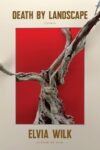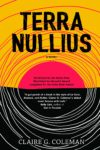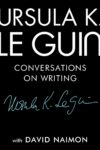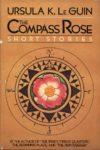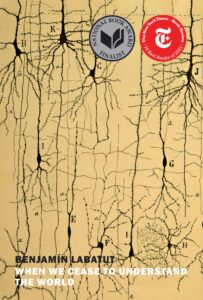
[NYRB; 2020]
Tr. from the Spanish by Adrian Nathan West
This book, the first by Chilean author Benjamín Labatut to be translated into English, begins with a twenty-four-page chapter that links the chemical composition of Prussian Blue, the earliest modern synthetic color pigment, to the industrial production of Zyklon B, the cyanide-based poison that Jews possessed of a particular gene might first have detected as an aroma of almonds flowing through the vents of the Holocaust gas chambers. Such a startling connection between art and atrocity, not to mention the crystalline precision and sensory detail that thread these disparate terms together, is a fitting introduction to When We Cease to Understand the World. Labatut’s four remaining chapters similarly wend through other twentieth-century scientific findings that traverse war, tragedy, and cataclysm. From weapons of mass destruction, he continues to the theorization and detection of black holes, to the consuming voids uncovered by pure mathematics, and to bitter debates regarding the meaning and modelling of quantum mechanics. Throughout, Labatut follows the improbable lives of the men — all men, in fact — who broach these momentous discoveries and face their immense, sometimes unraveling implications. Some of their names are more generally known — like Erwin Schrödinger, Werner Heisenberg, and Albert Einstein — while others are less familiar, such as Karl Schwarzschild, Alexander Grothendieck, and Shinichi Mochizuki.
If “Prussian Blue” is an apt entry to Labatut’s compelling book as a whole, the conclusion of this first chapter is especially important. Labatut devotes much of the latter parts of the chapter to the early twentieth-century German chemist Fritz Haber, who is famous both for inventing a method to synthesize ammonia from the atmosphere and for being the “father of chemical warfare.” He was thus responsible for innovating fertilizer-production techniques whose agricultural payoffs averted mass famine and enabled global population growth. He also initiated the research that would culminate in the pesticide that, by mid-century, the Nazis would use to murder millions of Jews, some of whom were Haber’s own relatives. Straddling these radically divided legacies, Haber died riven with remorse, although not for the reasons we might expect. On the chapter’s final page, Labatut explains in a pristine paragraph:
Among the few possessions Fritz Haber had with him when he died was a letter written to his wife. In it, he confessed that he felt an unbearable guilt; not for the part he had played, directly or indirectly, in the death of untold human beings, but because his method of extracting nitrogen from the air had so altered the natural equilibrium of the planet that he feared the world’s future belonged not to mankind but to plants, as all that was needed was a drop in population to pre-modern levels for just a few decades to allow them to grow without limit, taking advantage of the excess nutrients humanity had bestowed upon them to spread out across the earth and cover it completely, suffocating all forms of life beneath a terrible verdure.
Illustrating the power of Labatut’s voice and the elegance of Adrian Nathan West’s translation — a translation that the English-fluent Labatut helped to shape — this account brings a devastating end to Haber’s story. This unparalleled chemist who determined the modern world as we know it, who nourished generations and abetted genocide, dedicated his last recorded thoughts to forecasting a plant-induced apocalypse — a terror so alien as to seem unreal. And as I discovered soon after first encountering Haber’s “terrible verdure,” this vision is indeed unreal, a flourish of fiction atop a sea of history.
Especially when encountering a new author, I like to read the acknowledgments section before finishing the text proper. I suppose I like to ambush a book at its most sentimental, unguarded moments — an impatient, perhaps even unsporting readerly compulsion. In this case, I was particularly glad of this habit because skipping to the back of the book revealed this passage: “This is a work of fiction based on real events. The quantity of fiction grows throughout the book; whereas ‘Prussian Blue’ contains only one fictional paragraph, I have taken greater liberties in the subsequent texts, while still trying to remain faithful to the scientific concepts discussed in each of them.” The first sentence, about “fiction based on real events,” sounds like standard historical fiction; the second sentence, though, veers weird, doubling back against the first. What kind of book can be said to “grow” more fictional as it progresses, as if a text rooted in fact could somehow bloom fantastical? Labatut provides the answer. His book charts such an unusual trajectory because of its subject matter. He enlists imagination in order to stay true — to “remain faithful” — to certain “scientific concepts” so paradigm-shifting that exploring them requires the creative license afforded by literature and art more broadly. When asked in a recent Arts, Letters, and Numbers interview how he describes the book, Labatut put it this way: “It’s a strange book about strange ideas . . . [T]hose ideas sort of infected the form of the book.” It is the strangeness of the ideas that determined Labatut’s genre-defying approach. Thus, a book attentive to the ways in which science remakes reality such that we cease to understand the world recapitulates on the level of form this same destabilizing defamiliarization. As readers, we are unmoored just like these storied men of science, never sure whether we’ve drifted from the known to the wholly new.
One can imagine all manner of reactions to Labatut’s bold artistic decision. A certain kind of reader may well be repelled by the uncategorizable impurities of this book. Others will revel in its rich and interlocking narratives, which are by turns brutal and beautiful. Still, others may tread carefully, keen to mark out the increasing measures of fiction that, starting with the one final paragraph of “Prussian Blue,” grow until the last chapter appears to be a short story, albeit a metafictional one. Suspended between these poles of the historical and the fabricated are several more hybrid texts, the longest of which lends the book its title. As a reader, I found myself wedged in category two: I was driven by the momentum and magnificence of Labatut’s writing, fascinated to understand the world less and less with each twist, whether made-up or not. Indeed, the scattered fictional incursions always seemed trained on Labatut’s end-game of exploring just how little makes sense about some of the strangest scientific ideas of the past century. For instance, I was utterly enthralled by impenetrably abstract problems and paradoxes, like Labatut’s account of the uncertainty principle or his description of singularities — those “fundamentally unknowable” infinities of infolding space-time. Similarly, Labatut’s strategy to tell the story of initial quantum theorizing as a chronicle of several tortured, incompatible individuals brought human dimensions to a discourse concerned with the smallest conceivable physical processes. In these cases, fundamental questions — or questions about fundamentals — were rendered with remarkable clarity, urgency, and force.
Despite all the strangeness involved, however, the closest thing to a moral that emerges from this book is familiar, although refreshingly treated: it is the story of human hubris, the Frankenstein playbook of Prometheus meddling with essentials to the peril of natural balance. Indeed, the historical castle of Frankenstein and the cadaver-crazed alchemist who inspired Mary Shelley actually make a cameo appearance in “Prussian Blue.” In such a framework, scientists and theorists lead the charge into the unknown, often suffering immediate personal consequences while the rest of us are forced to bear more existential and enduring burdens. But for all the unsettling sublimity of Labatut’s exploration of this dilemma, there’s arguably something more disturbing in the possibility that we in the present have ceased to understand the world in a different sense altogether. Our current incomprehension stems less from brilliant breakthroughs than from the sheer, dumb perpetuation of industrialized modernity and its environmental costs. Put another way, the Anthropocene looms over this book like a cosmic joke, since what we lack now is not individual understanding but coordinated willpower, not knowledge but some inkling of selfless collaboration. This raises a version of the banality of evil argument: perhaps we take perverse pleasure in revisiting world-shaking scientists of the past because at least these individuals impress upon us the heights of the human spirit, the gravitas of striving thought and ambition. The Anthropocene, though, involves geologic force, not genius — glacial collectivity, not dogged determination. We have not so much ceased to understand the world as we have refused to confront our terrible understanding.
Labatut’s own description of his book makes recourse to the microscopic organic, perhaps even to the all-too-relevant vein of the virological: he says that the strange ideas of his book infected its form. However, I prefer the more botanical organicism suggested by his acknowledgements section, where the book is said to grow more fictional as it creeps along. After all, that first fictional excess in the final paragraph of “Prussian Blue” delivers us to a hellscape of green growth, that smothering “terrible verdure.” According to another interview, this one involving Labatut and his translator, West, this phrase best captures the original Spanish title of the book, Un Verdor Terrible. “Verdor,” West explains, is “verdure,” or “greenness.” While the publishing team decided to go a different direction for the English title, I am haunted by the green world without us. Indeed, Labatut’s first fictional paragraph reminds me of Ursula K. Le Guin’s marvelous science fiction story, “Vaster than Empires and More Slow.” Le Guin’s title derives from Andrew Marvell’s seventeenth-century metaphysical poem, “To His Coy Mistress,” the relevant lines of which read: “My vegetable Love should grow / Vaster than Empires, and more slow.” Here, Marvell invokes the vegetal to suggest a love that surpasses understanding. Literalizing this metaphorical conceit, Le Guin’s story chronicles a crew of interstellar surveyors who are dumbfounded upon discovering a planetary-scale plant consciousness. Having landed their spaceship on an alien world, the explorers first register its mass botanical sentience as an overwhelming atmosphere of fear — a terror that envelops everything, even themselves. Eventually, the crew realizes that the giant plant brain fears because it has never known an Other, never known anything but itself, a closed totality. The only way to quiet this fear is to embrace the planet’s green mind. Hence, one crew member chooses to disappear into the sprawling forest in what Le Guin calls an act of “unreserved surrender” that “left no place for evil.” Having “learned the love of the Other,” this character “has given his whole self.” Such sacrifice remains inexplicable. As Le Guin admits, “this is not the vocabulary of reason.”
Labatut’s novel is a stunning book about epistemic breaks — about sudden ideas that shatter across an age. His men of science are caught in gripping waves of hysteria, ecstasy, delirium, despair. And yet, as Haber’s vegetal vision suggests, the still more terrible truth is that the world grows ever more beyond our grasp with each passing moment, slipping silently and slowly beyond anything we could control, let alone understand. However, this impasse of understanding offers an opportunity for radical openness, what Le Guin glosses simply as “love.” Brought beyond our vocabulary of reason, might we come to meet the unknown not with fear but with willing sacrifice? Might we act even in the absence of total knowledge? If Labatut’s (mostly) historical characters are one by one undone by the earth moving beneath their feet, the sheer force and creativity of his writerly vision may nevertheless inspire us to press on past the end of the world as we know it.
Ben Murphy is a PhD candidate and writer studying American literature and race at the University of North Carolina at Chapel Hill. His research is published in American Literature, Mississippi Quarterly, and Configurations. Other writing — including essays, reviews, and interviews — can be found at The Millions, PopMatters, symploke, boundary2 online, Full Stop, Gulf Coast, and The Carolina Quarterly. He tweets @benjmurph.
This post may contain affiliate links.




